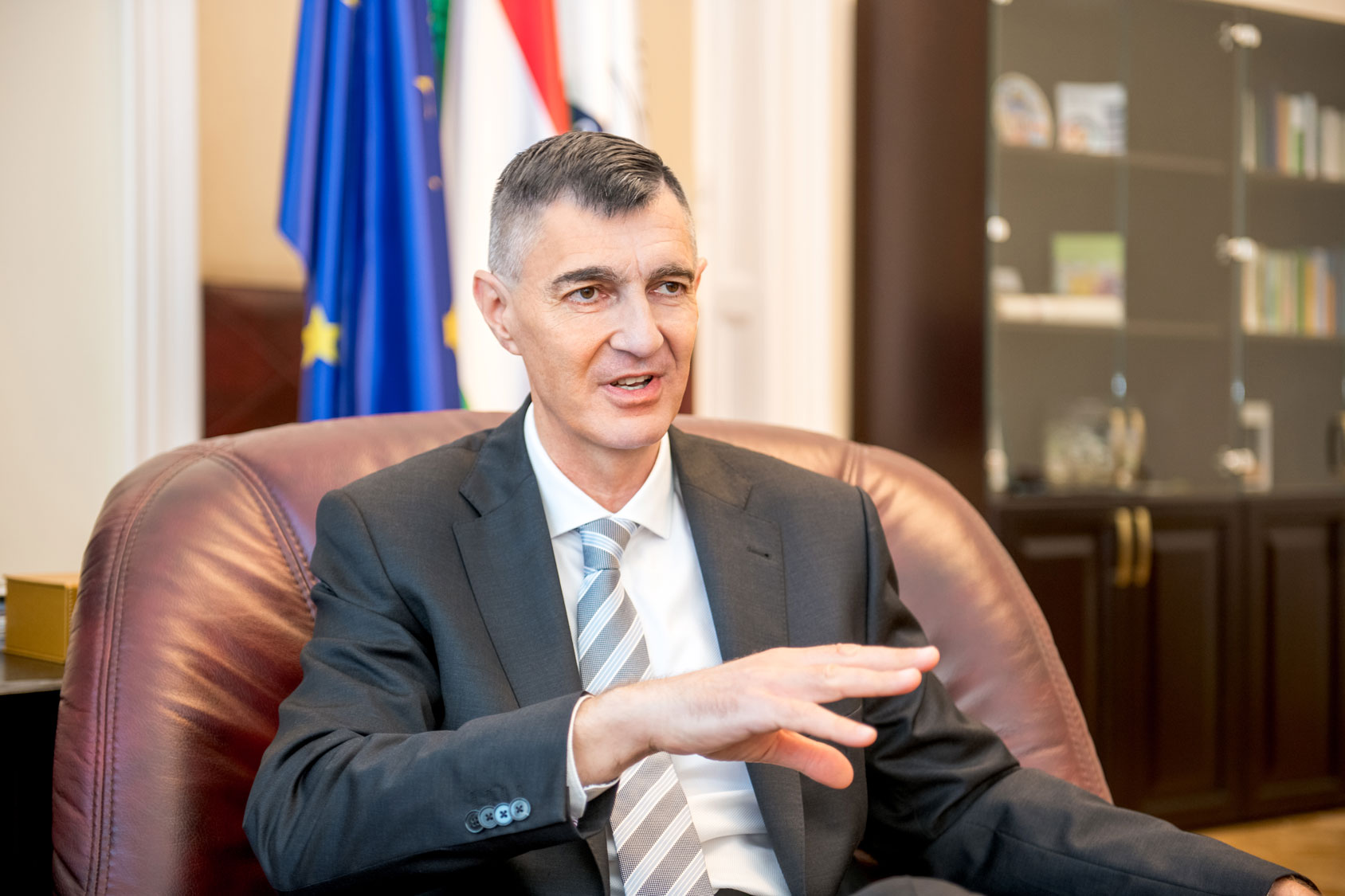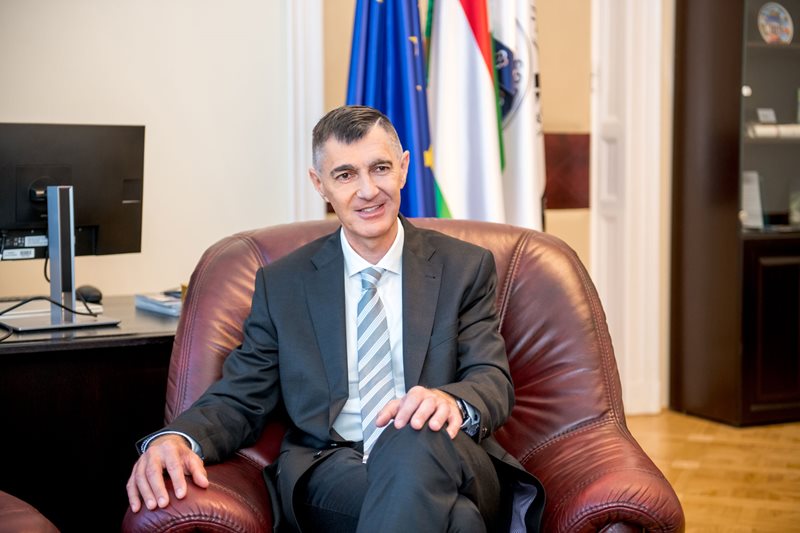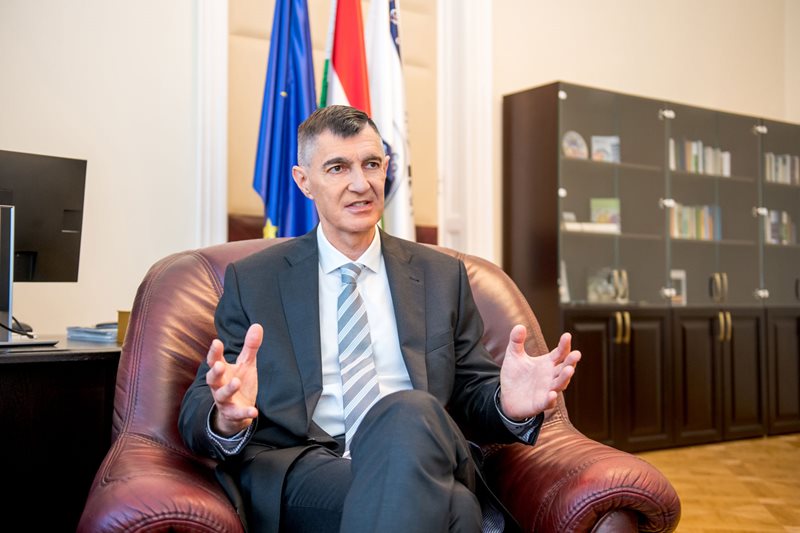Structural changes having been completed, this academic year is all about fine-tuning

Let’s start the discussion with a look back. You have played an active role throughout the renewal of the university for more than four years. What are you most proud of from this period?
I have been involved in the renewal process in several capacities, so I can list achievements in several areas that I am proud of. Of my work as Vice-Rector for Education, I consider the transformation of the education portfolio as the biggest success, as we have outlined a long-term development process. I am proud that colleagues have also seen the renewal potential of the study programmes and have been vigorously engaged in the process. We started with the bachelor study programmes, where improvements are well advanced. It was a huge job and luckily our calculations worked out. Our broad-based foundation programmes are popular, the newly launched PPE and Data Science in Business study programmes being among the bachelor study programmes with the highest admission scores in the country. I also consider it a success that a healthy competition has developed among colleagues: who can create more innovative, competitive educational content. I view it it a great attainment that instead of our previously isolated English-language training system, we now have more English-language programmes and more students studying in English.
As General Vice-Rector, the transformation of the structure of the institutes has been a major challenge, and I do not only view its successful implementation as an achievement, but rather as a necessary condition for further development. Institutes now have a clean profile, with a transparent system of objectives and performance assessment, which allows for good and consistent measurement of both individual and institution-level performance. This is important because overall academic performance is the sum of the performance of the institutes and centres of competence.
Beyond the areas under my leadership, I must highlight the spectacular rise in the university’s research performance over the past four years. I remember how colleagues were worried about meeting the strategic goal of increasing the number of their international publications – well, many of them have shown that they can. In fact, we are no longer talking about the number of Q1 or Q2 publications, but about how to increase the proportion of D1s within Q1; that is, the discussion is about qualitative rather than quantitative progress, and this is a really significant accomplishment.
Over the past four years, the organisation has made tremendous progress in performance-driven operations. I also think it’s a big step forward that we recognise achievements not only in professional micro-communities, but also at university level – think of our research wall of fame, the CRE prize or the awards- and we can celebrate each other’s successes. I’m also pleased to witness the launch of workshop-style collaborations, where two or three institutes come together in a project. Our task as executives is to encourage these multidisciplinary professional collaborations.

Besides the successes, where do you see areas for improvement?
I still feel a sense of lack, which is important because I believe we need to keep looking for challenges to move forward: this is the next step in our development. One such area is the issue of rankings. Obviously, progress in the rankings will not happen overnight, but it should be an important goal. Freedom of research is for everyone, but we cannot ignore the fact that a university will only be able to move up the rankings if its colleagues publish in the top journals in their respective fields. We also need to strengthen our academic and employer reputation: it is not enough to know that we are good and improving – we also need to make our achievements and changes visible to our partners and the academic community.
I see a lag in the development of organisational culture and attitudes. We have made great strides towards internationalisation, but it is in this area that we are most visibly not yet receptive and open to the integration of international colleagues and students. For example, at the moment we cannot have foreign colleagues on a significant part of our university boards, because their working language is now Hungarian, while nearly 20% of our teaching staff are already foreign. We need to change this, and the University is providing ongoing support, with the proofreading of English articles, specialist translation services, courses offered by the FLTRC, and the preparation of our language policy. The presence of international colleagues, students, diversity, thinking that is different from ours, and new approaches to problems can be a great added value for the whole Corvinus community.
Your duties as Acting Rector are limited in time, until the arrival of the new Rector. What are the most important, concrete tasks you would like the organisation to accomplish by then?
The Board of Trustees set clear and unambiguous expectations and tasks when I took office. These are in line with my own vision. One is the renewal of the bachelor study programme portfolio in the social sciences, and by the end of the year we need to specify the bachelor study programmes that we will offer in this field. The other is to create a radically new portfolio of master study programmes, because unfortunately many of our excellent bachelor students go abroad to continue their studies, and our retention rate is low. We need to create internationally competitive study programmes that take into account needs on the demand-side. The deadline here is also the end of the year.
The renewal of the academic career model is also a priority for this year. It will be a cardinal issue, because this complex system determines not only organisational but also individual work and performance. This will also give colleagues a feeling of comfort and security in knowing what is expected in the coming period. The first three-year cycle is now coming to an end, and we will incorporate the experience gained into the fine-tuned system, while at the same time we will have to carry out individual assessments in the autumn, and determine each colleagues’ path the next three years.
The fourth major task is to further develop Corvinus’ research strategy. A university is strongly dependent on the quality and effectiveness of its research work, so the kind of journals that we publish in and the level of publications do actually matter a lot. I have already mentioned the importance of rankings, and the relevant surveys show that rankings have a major impact on students’ choice of university at the international level, and also on the perception of the academic community. So if we want good students, if we want to improve our academic reputation, we have to come up with results in the rankings. The other strategic issue is how to fund research: we cannot rely on one source, we need to diversify. The Horizon international projects have shown that we are good and efficient at applying, but we need to explore other international opportunities, and bring in funds that finance research. We also aim to increase the number of international co-authored publications.
The baseline for the University’s talent management strategy will be finalised by the end of the year, and this will be used to start developing the operation of the talent management centre next year. We also continue to strengthen our internationalisation processes, as I said, we are working on the language policy, and in this context we are looking at how we can translate our academic processes into English, for example.

The ethics reviews that have taken place in recent months have been reported in the press. In two of the proceedings, you had the right to adjudicate at second instance. Why did you consider it justified to change the first instance decisions?
In short, because in the two cases in question, there were clearly mistakes, but not offences as defined in the Code of Ethics. The appeal procedure did not therefore establish any ethical abuse, and the allegations to the contrary in the press are therefore not true. In accordance with the legal provisions for privacy rights, the university will not disclose details of the case, even if others trample on these rights and try to put pressure on us through the press. In any case, the University is the place for settling professional debates. Those who seek to settle their internal conflicts, whether driven by their own or political interest, by exerting external pressure, harm the university, harm colleagues, harm students. As a result of the irresponsible behaviour of the associate professor who made the report, several of our students were subjected to unfounded accusations, causing serious psychological damage. Innocent students are being abused in the comments of the published articles and on social media. This cannot be tolerated by the university community!
The cases examined during the ethics procedures were very complex, not black and white cases, requiring lengthy investigation at both first and second instance to get the full context and details from all sides. The cases were closed, but during the investigation, the committee of first instance and I myself, independently of them, found a number of disfunctions and irregularities that I felt obliged to report. The aim is to develop controls that can be used to eliminate such cases on a systemic level. An action plan and timetable for this have been prepared and will be discussed by the Presidential Committee shortly.
Finally, what is your message to the university community at the start of the 2023/2024 academic year?
We have taken key steps in recent years that are essential for renewal, and now we need to focus on fine-tuning the functioning of the systems and working out the content. Although there is currently a transition of leadership in the academic area, the directions are clear and unambiguous, so I ask colleagues to continue the work we have started with the same intensity and the same quality standards!